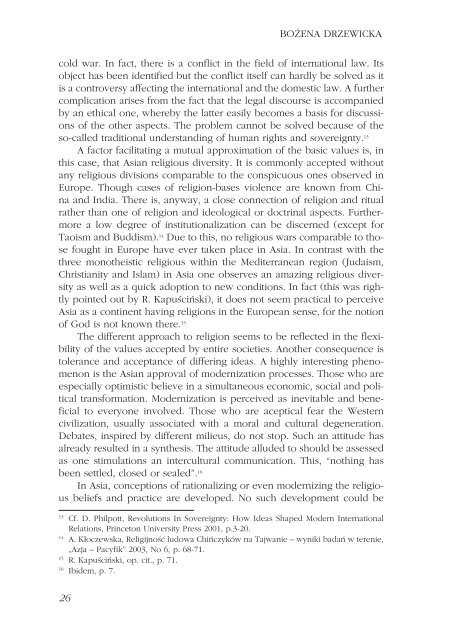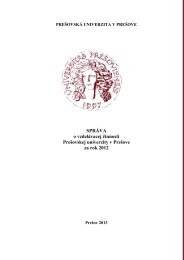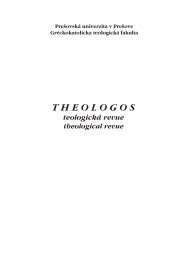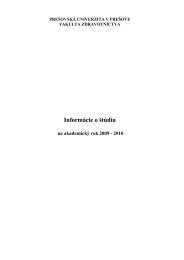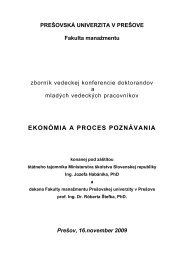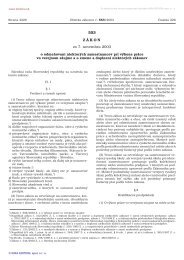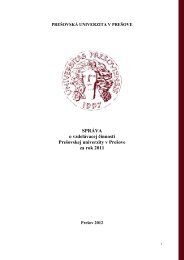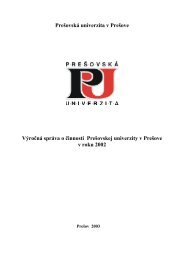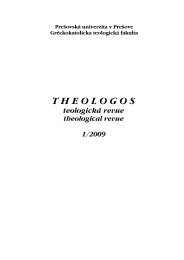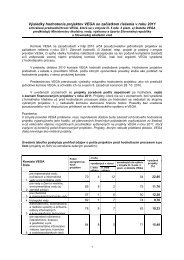T H E O L O G O S - Prešovská univerzita v Prešove
T H E O L O G O S - Prešovská univerzita v Prešove
T H E O L O G O S - Prešovská univerzita v Prešove
Create successful ePaper yourself
Turn your PDF publications into a flip-book with our unique Google optimized e-Paper software.
Bożena Drzewicka<br />
cold war. In fact, there is a conflict in the field of international law. Its<br />
object has been identified but the conflict itself can hardly be solved as it<br />
is a controversy affecting the international and the domestic law. A further<br />
complication arises from the fact that the legal discourse is accompanied<br />
by an ethical one, whereby the latter easily becomes a basis for discussions<br />
of the other aspects. The problem cannot be solved because of the<br />
so-called traditional understanding of human rights and sovereignty. 13<br />
A factor facilitating a mutual approximation of the basic values is, in<br />
this case, that Asian religious diversity. It is commonly accepted without<br />
any religious divisions comparable to the conspicuous ones observed in<br />
Europe. Though cases of religion-bases violence are known from China<br />
and India. There is, anyway, a close connection of religion and ritual<br />
rather than one of religion and ideological or doctrinal aspects. Furthermore<br />
a low degree of institutionalization can be discerned (except for<br />
Taoism and Buddism). 14 Due to this, no religious wars comparable to those<br />
fought in Europe have ever taken place in Asia. In contrast with the<br />
three monotheistic religious within the Mediterranean region (Judaism,<br />
Christianity and Islam) in Asia one observes an amazing religious diversity<br />
as well as a quick adoption to new conditions. In fact (this was rightly<br />
pointed out by R. Kapuściński), it does not seem practical to perceive<br />
Asia as a continent having religions in the European sense, for the notion<br />
of God is not known there. 15<br />
The different approach to religion seems to be reflected in the flexibility<br />
of the values accepted by entire societies. Another consequence is<br />
tolerance and acceptance of differing ideas. A highly interesting phenomenon<br />
is the Asian approval of modernization processes. Those who are<br />
especially optimistic believe in a simultaneous economic, social and political<br />
transformation. Modernization is perceived as inevitable and beneficial<br />
to everyone involved. Those who are aceptical fear the Western<br />
civilization, usually associated with a moral and cultural degeneration.<br />
Debates, inspired by different milieus, do not stop. Such an attitude has<br />
already resulted in a synthesis. The attitude alluded to should be assessed<br />
as one stimulations an intercultural communication. This, “nothing has<br />
been settled, closed or sealed”. 16<br />
In Asia, conceptions of rationalizing or even modernizing the religious<br />
beliefs and practice are developed. No such development could be<br />
13<br />
Cf. D. Philpott, Revolutions In Sovereignty: How Ideas Shaped Modern International<br />
Relations, Princeton University Press 2001, p.3-20.<br />
14<br />
A. Kłoczewska, Religijność ludowa Chińczyków na Tajwanie – wyniki badań w terenie,<br />
„Azja – Pacyfik” 2003, No 6, p. 68-71.<br />
15<br />
R. Kapuściński, op. cit., p. 71.<br />
16<br />
Ibidem, p. 7.<br />
26


